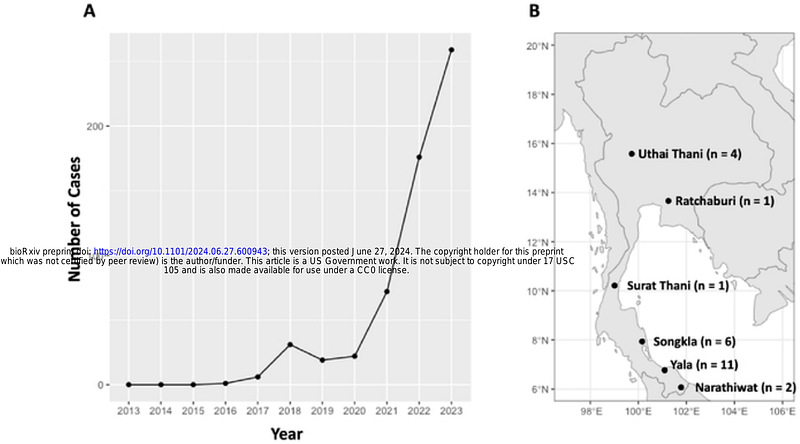Declining Genetic Polymorphisms of the C-terminus Merozoite Surface Protein-1 Amidst Increased Plasmodium knowlesi Transmission in Thailand

Declining Genetic Polymorphisms of the C-terminus Merozoite Surface Protein-1 Amidst Increased Plasmodium knowlesi Transmission in Thailand
Bantuchai, S.; Tapaopong, P.; Chainarin, S.; Mala, A.; Rannarong, A.; Kangkasikorn, N.; Kusolsuk, T.; Roobsoong, W.; Cui, L.; Nguitragool, W.; Sattabongkot, J.
AbstractRecent reports from Thailand reveal a substantial surge in Plasmodium knowlesi cases over the past decade, with a more than eightfold increase in incidence by 2023 compared to 2018. This study investigates temporal changes in genetic polymorphism associated with the escalating transmission of P. knowlesi malaria in Thailand over the past two decades. Twenty-five P. knowlesi samples collected in 2018-2023 were sequenced for the 42-kDa region of pkmsp1 and compared with 24 samples collected in 2000-2009, focusing on nucleotide diversity, natural selection, recombination rate, and population differentiation. Seven unique haplotypes were identified in recent samples, compared to 15 in earlier samples. Nucleotide and haplotype diversities were lower in recent samples (pi = 0.016, Hd = 0.817) than in earlier samples (pi = 0.018, Hd = 0.942). Significantly higher synonymous substitution rates were observed in both sample sets (dS-dN= 2.77 and 2.43, p < 0.05), indicating purifying selection and reduced genetic diversity over time. Additionally, 8 out of 17 mutation points were located on B-cell epitopes, suggesting an adaptive response by the parasites to evade immune recognition. Population differentiation analysis using the fixation index (Fst) revealed high genetic differentiation between parasite populations in central and southern Thailand or Malaysia. Conversely, the relatively lower Fst value between southern Thailand and Malaysia suggests a closer genetic relationship, possibly reflecting historical gene flow. In conclusion, our findings highlight a decline in genetic diversity and evidence of purifying selection associated with the recently increased incidence of P. knowlesi malaria in Thailand. The minor genetic differentiation between P. knowlesi populations from southern Thailand and Malaysia suggests a shared recent ancestry of these parasites and underscores the need for coordinated efforts between the two countries for the elimination of P. knowlesi.


